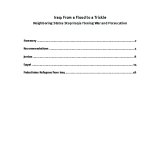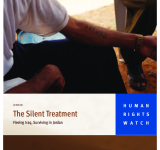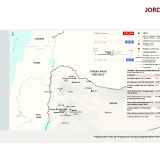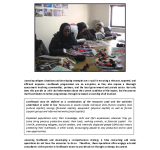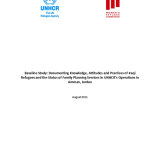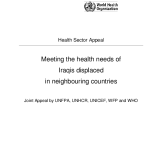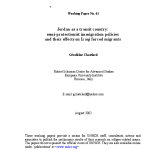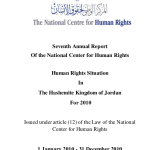asylum
بعد الفرار من العنف والاضطهاد في العراق;; فإن مئات الآلاف من العراقيين الذين يعيشون في الأردن يواجهون تهديداً يومياً للإعتقال والغرامات والترحيل وذلك لأن الحكومة الأردنية تعاملهم معاملة المهاجرين غير الشرعيين بدلاً من معاملتهم كلاجئين. منذ بدء الحرب في العراق في عام 2003;; نزح أكثر من مليون عراقي من بلدهم طلباً للجوء من البلدان المجاورة;; إلا أنه لا يوجد أي من الدول المجاورة للعراق;; ولا الولايات المتحدة;; يعاملونهم كلاجئين. وهذا التقرير يلقي الضوء على محنة اللاجئين العراقيين (والتماس الحلول له) وهي مسؤوليةً مشتركة بين الأردن والدول المجاورة والمجتمع الدولي.
This report outlines the regional response plan to Syrian refugees. It gives an overview of the situation of Syrian refugees in Jordan;; the plans and strategies that have be put in place to accommodate them. The overarching priorities in 2013 remain the registration and documentation of new arrivals;; basic protection;; and life-saving activities;; specifically: the establishment of adequate camp infrastructure;; provision of non-food items (NFI) to new arrivals in camps;; access to health care;; food assistance;; access to clean water in camps;; and physical protection including response to and prevention of sexual and gender-based violence (SgBV). Other essential activities include the identification and protection of unaccompanied and separated children (UA/SC);; access to education services and subsistence aid to the most vulnerable among the non-camp refugee population;; and improving access to water in refugee- hosting communities.
Assessing refugee situations and developing strategies are crucial in ensuring a relevant;; targeted;; and efficient response. Livelihoods programmes are no exception;; as they also require a thorough assessment involving communities;; partners;; and the local government and private sector. Not only does this provide us with vital information about the current condition of the region;; but the process itself contributes to better programmes through increased ownership of all involved. UNHCR Jordan developed a quality strategy using their internal resources and networks. This is a story about their experience and the lessons learnt in the process.
This report addresses a family planning (FP) study undertaken by the United Nations High Commissioner (UNHCR);; the Women's Refugee Commission (WRC) and the Centers for Disease Control and Prevention (CDC) among Iraqi refugees in Amman;; Jordan in June-July;; 2011. It documents the knowledge;; beliefs;; perceptions and practices of refugees;; as well as the state of service provision to improve programming and subsequently increase uptake of good quality FP services among Iraqi women;; men and adolescents.
This joint interagency appeal to the international community seeks a total of US$ 84;;833;;647 million to provide support to national efforts aimed at improving access to health care for displaced Iraqis living in Syria;; Jordan and Egypt. The activities prioritized in the appeal are based on the Common Action Framework agreed upon during the Ministerial Consultation to Address the Urgent Needs of Displaced Iraqis;; convened by WHO in Damascus from 29-30 July 2007.
This paper argues that Jordan has adopted a semi-protectionist policy towards Iraqi forced migrants;; i.e. letting them in but depriving them of a status;; therefore encouraging them to move forward. For their part;; despite minor differences;; Western countries all have adopted a reverse semi-protectionist policy;; i.e. limiting forced migrants access to their territories but granting those who have managed to enter liberal asylum while never deporting Iraqis back to the Middle East. Moreover;; Jordan and its Western partners are in agreement as regards the security threat posed by this new wave of forced migration while Middle Eastern Arab countries are still burdened by the unresolved case of Palestinian refugees.
This annual report comes to diagnose the situation of human rights in the Hashemite Kingdom of Jordan in 2010;; and to point out the positive or negative changes that have occurred during that period. The report comprises the outcome of the accumulated experiences of the Center in the field of protecting civil;; political;; economic;; social and cultural rights. It also comprises a qualitative addition represented in the devotion of an axis related to the assessment of how serious the Government is in taking appropriate legislative;; judicial and executive measures needed to implement the recommendations by the treaty committees. The main themes are: Civil and Political Rights;; Economic;; Social and Cultural Rights;; Women's Rights;; Child Rights;; Rights of Persons with Disability;; Rights of the Elderly. The report proposes legislations;; policies and measures that are believed to contribute to changing the current situation of Human Rights for the better;; especially in the light of the rapid developments taking place in the Arab region.
